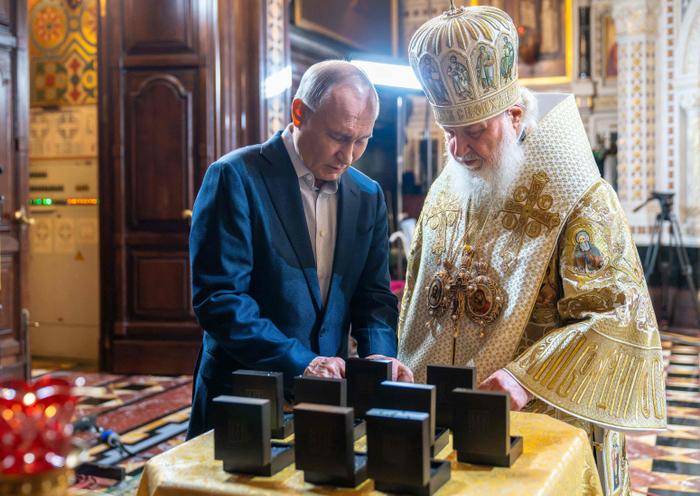Russian Orthodox Church Leader Sparks Controversy with Blessing of Crosses for Ukraine War Veterans
In a move that has sparked widespread controversy, the leader of the Russian Orthodox Church, Patriarch Kirill, has blessed crosses engraved with the initials of Russian President Vladimir Putin for distribution to veterans of the conflict in Ukraine.
The ceremony, which took place at the Church of Christ the Savior in Moscow, was attended by high-ranking officials from the Russian military and government. The crosses, which feature the initials "VVP" in Cyrillic script, are intended to be awarded to soldiers who have fought in Ukraine as a symbol of their bravery and sacrifice.
However, the move has been met with widespread criticism from both within and outside Russia. Many have accused Patriarch Kirill of politicizing the church and using its influence to promote the interests of the Russian state.
"This is a clear example of the Russian Orthodox Church being used as a tool of propaganda and manipulation," said a spokesperson for the Ukrainian Orthodox Church. "The blessing of these crosses is a blatant attempt to legitimize the actions of the Russian military in Ukraine and to promote the cult of personality surrounding President Putin."
Others have criticized the move as an attempt to blur the lines between church and state in Russia. "The Russian Orthodox Church is supposed to be a spiritual institution, not a mouthpiece for the government," said a Russian human rights activist. "This kind of behavior undermines the credibility of the church and damages its relationship with the Russian people."
The controversy surrounding the blessing of the crosses is just the latest example of the complex and often fraught relationship between the Russian Orthodox Church and the Russian state. While the church has traditionally been closely tied to the state, many have accused Patriarch Kirill of taking this relationship too far and compromising the church's independence and integrity.
The Russian Orthodox Church has played a significant role in the conflict in Ukraine, with many clergy members openly supporting the Russian-backed separatists in eastern Ukraine. The church has also been accused of providing spiritual and material support to Russian soldiers fighting in Ukraine.
In response to these developments, the Ukrainian Orthodox Church has sought to distance itself from the Russian Orthodox Church and to establish its own independence and autonomy. However, this process has been complicated by the fact that many Ukrainian Orthodox clergy members remain loyal to the Russian Orthodox Church and its leader, Patriarch Kirill.
The controversy surrounding the blessing of the crosses is likely to have significant implications for the Russian Orthodox Church and its relationship with the Russian state. Many have accused Patriarch Kirill of overstepping his bounds and compromising the church's independence and integrity.
The controversy is also likely to have implications for the conflict in Ukraine, where the Russian Orthodox Church has played a significant role in supporting the Russian-backed separatists. The move is likely to be seen as a provocation by many Ukrainians, and could potentially exacerbate tensions between Russia and Ukraine.
As the controversy continues to unfold, one thing is clear: the relationship between the Russian Orthodox Church and the Russian state is complex and multifaceted, and is likely to remain a source of tension and controversy for the foreseeable future.




No comments yet
Be the first to share your thoughts!